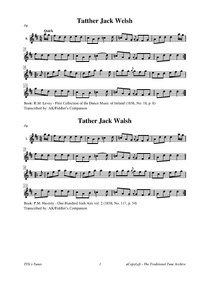Template:Pagina principale/Vetrina: Difference between revisions
No edit summary Tag: Reverted |
No edit summary Tag: Reverted |
||
| Line 18: | Line 18: | ||
The title derives from the Irish "An t‑Athair Jack Walsh;” ''Athair'' meaning Father, as in a Catholic priest with the form ''An t-Athair'' being Irish Gaelic usage before a proper name. | The title derives from the Irish "An t‑Athair Jack Walsh;” ''Athair'' meaning Father, as in a Catholic priest with the form ''An t-Athair'' being Irish Gaelic usage before a proper name. | ||
Carlin begs comparison with "[[Kate Caulfield's Jig]]" which he thinks is probably a variant of this tune. Tunes having the same basic melody are "[[Palatine's Daughter (The)]]," "[[ Garden of Daisies (2) (The)]]", "[[Savourna Delight]]," and "(Garbh‑) | Carlin begs comparison with "[[Kate Caulfield's Jig]]" which he thinks is probably a variant of this tune. Tunes having the same basic melody are "[[Palatine's Daughter (The)]]," "[[ Garden of Daisies (2) (The)]]", "[[Savourna Delight]]," and "(Garbh‑) Chnoicin Fraoigh (An)" (The Rough, Heathy Little Hill). | ||
See also the closely related Cape Breton tune " | See also the closely related Cape Breton tune "Charlie's Aunt" and the possibly partly-related “[[Little Brown Jug]].” The title appears in a list of tunes in his repertoire brought by Philip Goodman, the last professional and traditional piper in Farney, Louth, to the Feis Ceoil in Belfast in 1898 (Breathnach, 1997). | ||
<br> | <br> | ||
<br> | <br> | ||
Revision as of 08:07, 22 September 2024

Murtagh Murphy’s barn was full to the door when the eve grew dull, For Phelim Moore his beautiful new pipes had brought to charm them.
Played by: Andrew John Cairns
Source: Soundcloud
Image: Patrick Joseph McCall (6 March 1861 – 8 March 1919) known as "P.J. McCall"

The title derives from the Irish "An t‑Athair Jack Walsh;” Athair meaning Father, as in a Catholic priest with the form An t-Athair being Irish Gaelic usage before a proper name.
Carlin begs comparison with "Kate Caulfield's Jig" which he thinks is probably a variant of this tune. Tunes having the same basic melody are "Palatine's Daughter (The)," "Garden of Daisies (2) (The)", "Savourna Delight," and "(Garbh‑) Chnoicin Fraoigh (An)" (The Rough, Heathy Little Hill).
See also the closely related Cape Breton tune "Charlie's Aunt" and the possibly partly-related “Little Brown Jug.” The title appears in a list of tunes in his repertoire brought by Philip Goodman, the last professional and traditional piper in Farney, Louth, to the Feis Ceoil in Belfast in 1898 (Breathnach, 1997).
The title is among those mentioned in Patrick J. McCall’s 1861 poem “The Dance at Marley,” the first three stanzas of which goes:
Murtagh Murphy’s barn was full to the door when the eve grew dull,
For Phelim Moore his beautiful new pipes had brought to charm them;
In the kitchen thronged the girls - cheeks of roses, teeth of pearls -
Admiring bows and braids and curls, till Phelim’s notes alarm them.
Quick each maid her hat and shawl hung on dresser, bed, or wall,
Smoothed down her hair and smiled on all as she the bawnoge entered,
Where a shass of straw was laid on a ladder raised that made
A seat for them as still they stayed while dancers by them cantered.
...more at: Tatter Jack Walsh - full Score(s) and Annotations
X:0 T:Tatther Jack Welsh M:6/8 L:1/8 R:Jig Q:"Quick" B:R.M. Levey - First Collection of the Dance Music of Ireland (1858, No. 18, p. 8) Z:AK/Fiddler's Companion K:D V:1 clef=treble name="0." [V:1] a/g/|fdd ded|cAB =c2d|=cAG {A}GFG|Add d2 a/g/| fdd ded|cAB (=c2d)|=cAG {A}GFG|Add d2:| |:A|dfa afd|dfa a2f|gag {a}gfg|ecd efg| afd ded|cAB =c2d|=cAG {A}GFG|Add d2:|]
